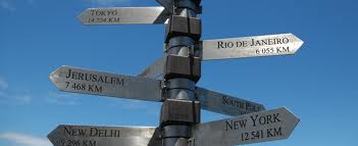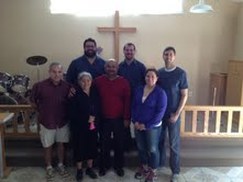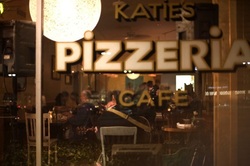|
Maybe this is nothing new to you, but things change. To make sure we're on the same page, I've been speaking this to my congregation's leadership. Before we can step forward, we must know what we're stepping into. Here are three changing assumptions that will change how we operate as the church.
Christian to Non-Christian Context We are entering/living in a post-Christian society where the institutional church is no longer a dominant influence in culture. This doesn't mean the church is dead. It simply means that as a societal force, Christianity's sway is waning. Countless books, articles, and conferences center around this topic, so I won't belabor the point. The bottom line is that we have to accept the new reality. It doesn't help to have insider Christians complaining, "Why hell won't people just come back to church like they used to?!" So what do we do? We start operating like we "live in the bush." A couple generations ago, missionaries were sent "to the bush" - exotic places like Papua New Guinea where isolated tribes had never been evangelized. A missionary had to immerse himself or herself into the culture to understand the people's language, customs, beliefs, and values. Let's assume our neighbors have no biblical foundation. Let's assume they practice a variety of religions, but are unfamiliar with the Christian worldview. Let's evaluate everything we do as if we live in a foreign context. I guarantee it will change what we do. Clergy-Centered to Every Christian A clergy-centered model of ministry meant that pastors "do the ministry." An "every Christian" model assumes that every member plays a role. Somehow we've gotten to a place where "ministry" only happens on Sundays and the pastor is the only one who does it. So Christians participate in ministry only by coming to "the Jesus show" (I heard this term recently). The "every Christian" model is nothing new (I Peter 2:9). It doesn't mean that every Christian has the same role, but that every Christian plays a role (I Cor. 12). It doesn't diminish corporate worship, but sees that one hour in the context of the other 167 hours in the week. And its doesn't diminish the role of the pastor. Pastors serve the people so the people can serve the world. So what do we do? We raise the bar. Christian membership comes with faithful responsibility. Regardless of gifting, every Christian is called to live out the Great Commission and the Great Commandment. If 60% of my city is disconnected or unconnected from Jesus (and that might be low), then 1.2 million people need to be reached in my metro area. This requires a movement, not one man. Place to People Christendom built institutions, buildings, and programs. Post-Christendom necessitates the building of relationships. In a diverse, global, and technological context, relational capital is at a premium. In another era, it was the Field of Dreams mantra, “Build a place and people will fill it.” Today the places aren't being filled. So the new mantra is, "Build a people and they will fill a place.” Our neighbors have a million places to go. But they know fewer people who care. So what do we do? Get off my computer and go find some people . . .
0 Comments
Pastor and author Carey Nieuwhof wrote this recently, “Much of the church’s outreach over the last 60 years has been based on a few assumptions that are less and less true every year.” He lists three assumptions that are no longer true. They illustrate what it looks like as we move from an era of Christendom to a post-Christian society.
o Young adults will return to church when they have kids. First of all, they're having fewer kids (or none at all). Second, when they do have kids, church is one activity among many (soccer, dance, tutoring, etc.). o People will turn to God when they hit a crisis. If they hit a crisis, they might turn to God. And if they do turn to God, they don't look to the church. Among younger generations especially, there is a distinct separation between the church and God. o Most people will come back to what they left when they were young. We now have people who are 2nd or 3rd generation unchurched. They have nothing to go back to because they were never there. For decades, we've built our church programming around these assumptions. What happens when these assumptions are no longer true? Are we building ministry around a people who no longer exist (or are a rare minority)? What does it look like to build ministry around the existing reality? I cringe at the evangelism models that literally scare the hell out of people. "If you were to die tonight, do you know where you would go?!!!" "Well, you make hell sound really bad. So I guess . . . heaven?"
My Irish friend Robert Millar has helped me process helpful ways to engage non-Christians. He's the director of Young Life College - St. Louis. We're writing a book . . . someday. Before that amorphous date, here are six general things I lift up for your consideration.  For the first time in U.S. history, there were more recorded deaths than births among white Americans in 2012, according to a new analysis of Census Bureau data. The difference was tiny - 12,400 more deaths among non-Hispanic whites than births - but marked a demographic turning point, as the white population shrinks. A man once asked Jesus, "Who is my neighbor?" (Luke 10:29). For us Americans, the answer is a tapestry of color and culture. Our country is far from a monolithic demographic. On the one hand, there is great challenge to living out Jesus' Great Commandment in our diverse society. On the other hand it's simple, for love transcends color and culture.
One question is, "Who is my neighbor?" Another question is, "Who isn't?" It's a bit lengthy, but an article I wrote was just published in Missio Apostolica, the journal put out by the Lutheran Society for Missiology. Here's the new May 2013 edition. The whole issue is on reaching the Millennial generation.
A single word has been haunting my pastoral work for a few years. I've devoted considerable time and attention to it, but I think I'll be chewing on this one for years to come, if not the rest of my life. It's a simple word and I believe that it holds tremendous importance for the future of the church. It's an old word, and we're trying to reclaim in in my congregation. The word is sent.
 In an insightful article, Leo Sanchez of Concordia Seminary observes the election of a new Pope. He notes some of the obvious. For one, Pope Francis (Horge Mario Bergoglio) represents a geographic shift to the global South. Sanchez draws out the implications for the the church in the West. Historically, Europe was the "colonizer" and the "evangelizer." Today, Sanchez notes, "the evangelized are now the evangelists." Might an Argentinian Pope from a Latin American context bring a resurgence of the gospel back to Rome and Europe? In terms of Lutherans, Sanchez writes, "An old church in decline will most likely only survive through the witness of the new diaspora Lutherans in other parts of the world and even within the U.S." The concept of Diaspora Missiology is an intriguing one to me. The Western Church is in desperate need of what the Global South has to give. Our theology and culture are so intertwined that it is hard for us to recognize when they get tangled. For instance, what does it really mean to be a Lutheran Christian, apart from being Germanic or Scandanavian? Can we separate our convictions from Lutheran potlucks, institutions, and entrenched formalities. There is the benefit of an enriched perspective when you travel to a foreign land and culture. But what if the cross-cultural experience came to you, in your context and culuture? We are blessed by the immigrant and refugee Christians who settle among us. They may well be used by the Spirit as instigation for a church in need of renewal. We pray for their presence and leadership among us.  I believe in continuing education. So a couple weeks ago I took a ministry field trip to San Diego. I wanted to go to a diverse context in a coastal location. And I'm not an idiot - San Diego in March is the place to be. And I'm really not an idiot - I took my wife (and no children). We visited some young pastors and church planters in the San Diego area. Each of them in a different setting: church plants in downtown San Diego and a northern suburb; a 60-year-old congregation in an eastern suburb; a Hispanic mission planter; a Lutheran mission organization just over the border in Tijuana, Mexico. In some ways, an American city is an American city. Globalization, technology, and modern mobility have given us many common threads. At the same time, the Midwest is insulated. The San Diego guys were saying the percentage of unchurched people in San Diego is around 85%. In my city, I'd say it's about 50-60%. It's a different cultural context, and the church holds a different place in society. Its generally true that "practicing Christians" are a minority on our country's coasts. The Midwest and the South still maintain a Christian stronghold. For instance, Texas has a billion megachurches (Okay, not a verifiable fact, but everything is TX is big - including it's Christianity.) By contrast, it's been said that there are more dogs in Seattle than Christians. Our coastal cities excite me in terms of the church's mission. I firmly believe we must send our best to the most difficult places. That's why I enjoyed spending time with these gifted pastors and church planters in San Diego. These are quality leaders doing ministry in a place where the church is challenged. That said, the ministry takes a toll on these guys. My general sense is that they can easily feel alone, especially in a church body whose geographical center is the Midwest. They wrestle with issues such as finding like-minded allies and funding their ministry. I have prayed for them in the two weeks since my visit. And I've been thinking, "How can we help our people on the 'frontier?'" And, "Is the frontier closer than we think?" We have a remarkable young man at our church who is currently studying abroad this year in Ecuador as a junior at St. Louis University. Sito is immersed in the Spanish language, South American culture, and a unique religious context. As a young man considering pastoral ministry, his worldview has been stretched.
Sito and I Skype from time to time and last night we chatted for over an hour. (Are you reading this, Sito?) One thing he has observed this far is the fact that he is a complete outsider. He is American. His Spanish comes with an accent. And being Lutheran, he is a religious anomaly. Much of South America is obviously rooted in Catholicism. But there is also a powerful charismatic insurgence throughout the region. Lutheran Christians enjoy cult status. In the U.S., Sito is a natural leader. Personable, smart, and gifted. In Ecuador, he is "at the bottom" - a learner of the culture, language, and customs. He has occasionally wondered, "Does anyone here really know me as a person?" Not just as the novel exchange student, or the foreigner. Cross cultural experiences always make me take note of the outsider. In all my life's vocations, I am a leader, one who influences, the consummate insider. But what does it look like from the other side? The visitor who timidly enters the back door of my church and quietly leaves through the same door. The neighbor whose life experience is vastly different than mine. The foreigner in my community who has limited access to all the things that are open to me. Sito mentioned an appreciation for Romans 12:15: "Rejoice with those who rejoice, weep with those who weep." Take on the cause of the other. Enter into the life of your neighbor. Really know them "as a person." Join them in their status as "outsider." Check out Sito's blog.  We crowded around a table at Katie's Pizzeria in Clayton for lunch on a hazy St. Louis afternoon. The four Regeneration presenters sat down to hash out the details of the upcoming summit in St. Louis October 7-8. The Professor, the Latin American Missionary, the Business Guy, and the Irish College Director. Add myself and the Youth Guy, and it was an odd conglomeration that got stares from the busy lunch crowd at Katie's. The Irish guy was peculiarly difficult and asked for water without ice . . . Europeans. With the theme of "Walls," the summit is a little over a week away. Dr. Andy Bartelt: "Everything flows from our ecclesiology. Who are we as church? We have to get past our institutional definitions." Jon Graf: "People only get busier and over committed. How will we carry out the mission with a people impoverished for time and money?" Robert Millar: "What do people perceive when Christians seem to be playing out a Jerry Springer episode?" Mark Kempff: "Statistics are coming out that last year there were more Hispanic babies born in the U.S. than white babies. Changing demographics are creating greater isolation and polarization. An example is 'white anxiety.' But the church must ask, 'Who is my neighbor?' The answer is, 'Who isn't?'" All in all, this table at Katie's was a riot. There was almost a fight. There were tears of laughter. A rousing rendition of "A Mighty Fortress." And then hugs to go around. Hope you can join this table of hoodlums October 7-8. |
JOIN My Tribe
|




